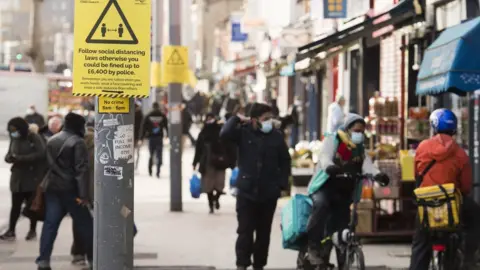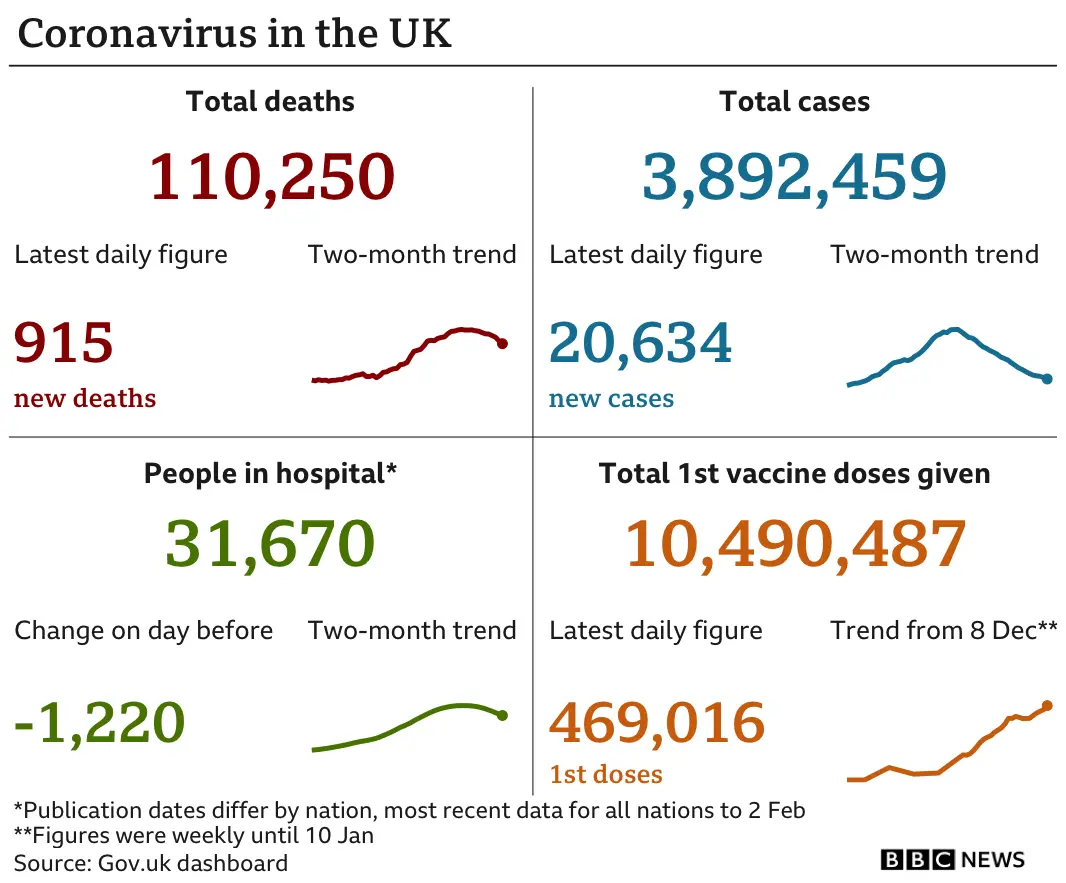Covid-19: Avoid 'setting dates' for lifting lockdown, scientist warns
 PA Media
PA MediaThe UK government should avoid "setting dates" for when to lift lockdown and instead react to changing circumstances, a scientist has warned.
Prof Graham Medley, a member of the Scientific Advisory Group for Emergencies, said leaders should not be "driven by a calendar".
Meanwhile, the government has said all over-50s should be vaccinated by May.
And a senior Conservative MP has told the BBC that Downing Street should be "looking to open up" society.
Sir Graham Brady, who leads the 1922 Committee of Conservative Party backbenchers, cited the falling infection level and success of the vaccine rollout, telling the BBC the situation was "optimistic".
The government estimate of the R rate - the average number of people someone with Covid will go on to infect - has dropped slightly to between 0.7 and 1, from between 0.7 and 1.1 for the week before.
But Prof Medley - who chairs the modelling group SPI-M, which advises Sage - told the BBC's Today programme that the epidemic could still go in two directions, up or down, and "it's up to the government to decide which of those paths it takes".
He urged a strategy of "adaptive management so you actually change the control of the epidemic as it goes along rather than setting dates, for example".
This means rather than setting dates of when rules could ease, there would be some sort of threshold of what the government would do if certain criteria are met.
"To actually make decisions dependent on the circumstances, rather than being driven by a calendar of wanting to do things," Prof Medley added.
The government has always insisted it is guided by the science - but Prime Minister Boris Johnson has often given dates when expressing hope about the future of the pandemic, for example saying things will be better by Easter and being hopeful about summer holidays.

- GLOBAL SPREAD: How many worldwide cases are there?
- NEW VARIANTS: How worried should we be?
- LOCKDOWN TIPS: Five ways to stay positive
- VACCINE: When will I get the jab?

Asked what type of circumstances the decisions could be based on, Prof Medley said case numbers were important.
"Vaccination offers a way out and it does reduce the impact of infection, but it doesn't remove it completely," he said. "And so case numbers are still important because they represent the risk of having to go back into some kind of national measures.
"At the moment, we're in a relatively good position in a sense that the number of cases are falling, but they're still very high. So we only need one more doubling time, one more return to exponential growth, and we could be back in the same position we were in the beginning of January within two weeks."
"The lower the numbers of cases, the more time you will have to react if they start to increase."
Infection levels have been falling since early January, and newly-released data shows that cases are down in every UK nation apart from Wales.
Nearly 10.5 million people have received a first dose of the vaccine so far. And on Friday, the Cabinet Office issued a press release saying it plans to vaccinate all of the first nine priority groups - including the over 50s - by May, giving it confidence to press ahead with the local elections.
The government also announced a deal with biopharmaceutical company CureVac, which Business Secretary Kwasi Kwarteng said would allow the UK to "swiftly tweak and roll out" existing vaccines to combat new variants, with 50 million doses placed in an initial order for later this year.
The latest figures show the UK recorded another 20,632 coronavirus cases on Thursday. A further 915 deaths within 28 days of a positive test were also reported, taking the total by that measure to 110,250.
And around one in 65 people in private households in England and Northern Ireland had Covid last week, according to estimates from the Office for National Statistics. In Wales, that figure was one in 70, while in Scotland it was one in 115.
The ONS also found that almost six in 10 adults say they are following "stay at home" lockdown rules by only leaving home for their basic needs. The figure is less than during the first national lockdown, when around 81% of people said they obeyed, and higher than in November.

Analysis
By Philippa Roxby, health reporter
Now that more than 10 million of the UK's most vulnerable have been vaccinated, daily cases of the virus are falling, fewer people are being admitted to hospital and there are early signs of deaths coming down, there is pressure to start the process of returning to normal.
But what will that process look like? Relax restrictions too quickly and there's the risk that cases could start to rise again in the unvaccinated. Move too slowly and the economy, jobs, children's education and people's mental health could suffer unnecessarily.
Some advocate a responsive approach - keeping a close eye on infection levels, which experts warn are still worryingly high, and other data, then reacting quickly when relaxations appear to be making things worse.
This is in contrast to, for example, setting fixed dates for schools to open which may then have to be changed nearer the time.
Reopening schools has always been the priority. Making that happen safely while carefully opening up other parts of society is now the greatest challenge.


Sir Graham - who has previously opposed lockdown rules - told the BBC the argument for going into a third national lockdown was to stop the risk of the NHS being overwhelmed.
"The NHS has actually coped spectacularly well," he said. "Now that that threat is receding, we ought to be - and indeed we are, and the government says we are - looking to open up."
Other politicians are urging a cautious approach to lifting lockdown.
Former Conservative health secretary Jeremy Hunt told BBC Radio 4's World at One the country had to target getting cases "down significantly from their current levels", making a comparison with South Korea, which he said had about 400 cases per day.
He said: "If we really want to avoid going into a fourth lockdown, we're going to have to be much better at isolating and quarantining anyone who has the new variants."
Mr Hunt added he thought the "end of the pandemic is within sight" - but that the country needed to keep a "weathered eye one these vaccines and variants".
Earlier this week, Labour leader Sir Keir Starmer also warned against lifting restrictions too early.
On Friday, government minister James Cleverly said he was not able to give a timetable of restrictions easing, but said plans will take into consideration "the needs of the economy, people's mental health, the education of our children".
"The decisions will be based on the assessment of what is safe, as well as effective," he said.
A spokesman for the Department of Health said the government continues to follow advice from scientific and medical experts.
"As the prime minister has said, the government will set out a plan for taking the country out of lockdown during the week beginning 22 February, with the clear aim of taking a gradual, phase approach that is sustainable."

- CHINA AND THE PANDEMIC: The gulf between what Chinese officials knew and what they told the world...
- KATIE PRICE: HARVEY AND ME: A deeply personal film following Katie Price and her disabled son Harvey in a crucial year of his life

